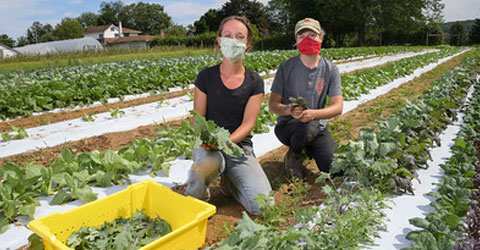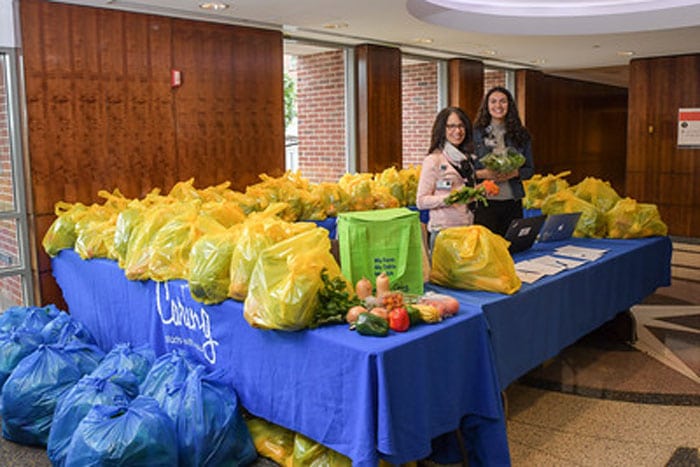

The following is an article from a Community Grant recipient.
Research shows that eating a well-balanced diet and maintaining a healthy weight can help reduce risk for many health conditions, including hypertension, hypercholesterolemia, hypertriglyceridemia, diabetes and certain cancers. But only a minority of Americans eat a well-balanced diet. According to the CDC, 87% of the US population in 2013 did not meet vegetable intake recommendations and 76% did not meet fruit intake recommendations.
In 2014, the St. Luke’s University Health Network (SLUHN) Employee Wellness Team set out to establish an employer-based population health model that uses evidence-based lifestyle medicine programming to improve the health status of the 21,000 employees and spouses of St. Luke’s University Health Network. Despite being a large health care network—responsible for reinforcing the importance of nutrition to overall health and treating the public—initial biometric assessments showed that the employee population itself had tremendous room for growth. Guided by a staff board-certified lifestyle medicine physician, SLUHN began to develop and implement evidence-based programs across the network to improve the metrics and lower health risks.
The community supported agriculture (CSA) work-site produce delivery program was designed to make it easier for employees and their families to get produce and eat more fruits and vegetables. In 2013, the CSA program had 89 members at 3 sites; by 2020, it employed 8 local farmers who delivered their produce to almost 600 members at 19 locations. The total number of CSA shares purchased increased 500% from the first to the sixth year, and by 2017, we had already seen a nearly 13% increase in the number of participants who were consuming 5 or more servings of vegetables and fruits.
These specific gains reflect the more general trends associated with CSA membership. The positive impact of such initiatives is well documented. Research by Cohen, Gearhart and Garland (2012) confirms the positive correlation between CSA membership and increased fruit and vegetable intake.
The potential benefits are clear: we know that having access to weekly shares of fresh, local produce increases intake of vegetables and fruit; and we know that increased fruit and vegetable consumption has demonstrated positive health benefits.
Although the program has been successful for six years, there are some employees who aren’t in a financial position to afford the $19.00/week commitment, and 2020 has been particularly difficult on employees. Many have been partially or fully furloughed due to the COVID-19 pandemic, and several CSA members have left the CSA as a result of this financial strain. Though we were able to emphasize the benefits of local food supply and access to help fill the spots of those who dropped out, we were unable to help those suffering from low wages or loss of income.


Given that employees will likely be dealing with financial consequences of their change in income for months or years to come, it’s important that we set up a sustainable plan moving forward to provide subsidies for those unable to afford the price of the shares. The grant from the T. Colin Campbell Center for Nutrition Studies will help us pilot a process by which 10 employees will be awarded subsidized shares. This will increase access to the CSA program and help those who may otherwise may not be able to participate.
Long term, we hope to provide far more employees the opportunity to participate in a reduced-cost program. The potential benefits are clear: we know that having access to weekly shares of fresh, local produce increases intake of vegetables and fruit; and we know that increased fruit and vegetable consumption has demonstrated positive health benefits. If the subsidized share pilot is successful, we can expand it in the future through grants, as well as employee or community donations.
The T. Colin Campbell Center for Nutrition Studies (CNS) is committed to increasing awareness of the extraordinary impact that food has on the health of our bodies, our communities, and our planet. In support of this commitment, CNS has created a Community Grant initiative to empower sustainable food-based initiatives around the world by providing grants to enable innovative start-ups and to propel the growth of existing initiatives. Please consider making a donation to this great cause. 100% of your donation will go to support initiatives like the one you just read about in this article.
Copyright 2026 Center for Nutrition Studies. All rights reserved.
Deepen Your Knowledge With Our
Plant-Based Nutrition
Certificate
Plant-Based Nutrition Certificate
- 23,000+ students
- 100% online, learn at your own pace
- No prerequisites
- Continuing education credits






